
Automation is transforming the SEO landscape in a multitude of ways — with one important function being streamlining the often laborious keyword research process. Case in point? While a tool such as ChatGPT is not a dedicated keyword research platform, it can provide valuable insights, generate keyword ideas, and automate various aspects of keyword research and analysis.
However, it’s important to remember that AI keyword research is most effective when used in conjunction with human expertise, since you know your industry better than an AI algorithm, after all — combining these two approaches can help you uncover relevant, high-value keywords more efficiently.
Here’s all you need to know about using AI for keyword research.
Can you automate keyword research?
Yes! While there’s an art to keyword research and of course, finding terms that you can actually rank well for requires expertise, the reality is keyword research can be a pretty mundane and monotonous task for digital marketers and SEOs — and that’s why it’s a perfect candidate for automation.
But while AI tools can help streamline the process of keyword discovery, the strategic decisions about which keywords to target should be made by marketers or SEO professionals who explicitly understand their organic growth goals and their target audience.
AI tools also heavily depend on trained data, and if the data they use is outdated or incomplete, it can result in inaccurate keyword suggestions or ineffective targeting. For a more comprehensive approach, consider inputting your AI-generated keywords into a dedicated keyword research tool such as Ahrefs, to gain deeper insights and metrics and make more informed, strategic decisions.
How to use AI for keyword research
AI can help with keyword research from the initial stage of discovering search terms to implementing the findings through smart content creation and optimisation. ChatGPT is one of the most versatile and widely-used generative AI tools in existence today, and among its many capabilities — though some are admittedly still not 100% reliable — it can be leveraged as part of a keyword strategy.
Here are some of the ways that ChatGPT can be used for keyword research:
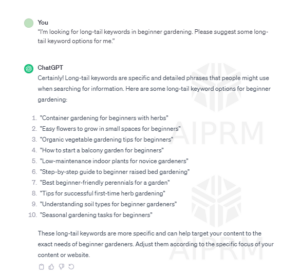
Long-tail keyword suggestions: ChatGPT can be effective for generating long-tail keywords, which are often less competitive and can be valuable for niche marketing. You can specify your niche, product, or service for ChatGPT to suggest long-tail keywords related to it.
“I’m looking for long-tail keywords in [your niche/industry]. Please suggest some long-tail keyword options for me.”
Keyword idea generation: You can start a conversation with ChatGPT and provide it with a general topic or niche relevant to your business. ChatGPT can then generate an initial list of keywords and phrases related to that topic to explore.
“I need keyword ideas related to [your topic/niche]. Can you provide some relevant keyword suggestions?”
Seasonal keyword trends: When creating a Christmas SEO strategy or another seasonal campaign, you can inquire about seasonal keyword trends related to your industry. ChatGPT can provide insights into keywords that tend to gain popularity during specific seasons, helping you plan timely content.
“I’m curious about seasonal keyword trends in [your industry]. Can you suggest keywords that typically trend during specific seasons?”
Event or conference keywords: If you’re participating in or hosting an industry event or conference, ask ChatGPT to suggest keywords relevant to the event. This can help you rank well for related search terms around the specific event.
“I’m involved in [event/conference] in [date/location]. Can you help me generate keywords that would be relevant for content related to this event?”
User intent analysis: Describe the type of content you plan to create or the questions your target audience might have. ChatGPT can then provide insights into the likely user intent behind those queries, helping you understand what people are looking for and how to structure your content.
“I’m planning to create content about [your topic]. What are the likely user intents associated with this topic, and how can I tailor my content to address them effectively?”
Content optimisation: If you have existing content and want to optimise it for specific keywords, you can ask ChatGPT for recommendations on how to incorporate those keywords into your content better.
“I have a piece of content about [your topic]. How can I optimise it for the keyword [your target keyword] to improve its SEO value and user engagement?”
Local SEO: If your business is local, ChatGPT can help you brainstorm local keywords by providing it with your location and niche. It can suggest local keyword ideas that target your specific geographic area.
“I’m running a [your type of business] in [your location]. Can you help me brainstorm local SEO keywords that would attract more customers in my area?”
Content ideas: In addition to keywords, ChatGPT can also generate ideas for new content based on popular topics and trends within your industry. These ideas can serve as a starting point for content creation.
“I’m looking for fresh content ideas in [your industry/niche]. Can you provide some relevant or popular topics I can explore in my content strategy?”
As you learn more about the capabilities of your chosen tool, it’s a good idea to create a list of useful prompts for each task, as this will make the process even quicker. Eventually, you’ll have a valuable list of fine-tuned prompts that will make it easier to interact with the tool and generate relevant keyword ideas and suggestions.
What is the best AI tool for keywords?
Nowadays, solid on-page SEO is not enough. Securing high positions in the SERPs requires you to keep your finger on the pulse of your industry, both in terms of your specific niche and wider changes such as new search engine algorithms. Leveraging the latest technology you have access to — in this case, AI keyword research tools — can help you stay competitive in an evolving SEO landscape.
Here are some of the tools we use for keyword research:
ChatGPT
As we’ve discovered, ChatGPT isn’t specifically designed for keyword research, but it can be a valuable tool in the brainstorming and creative aspects of keyword research. For example, you can gain insights into the intent behind certain queries; however, it’s best used alongside dedicated keyword research tools for better accuracy.
CopyAI
Originally an AI content writing tool, CopyAI also has some pretty impressive capabilities when it comes to keyword research. Using its “Keyword Generator” feature, you simply add your main topic or niche and the tool produces a seed list of broad keywords. You will need to run these terms through a dedicated keyword research tool to determine search volume and difficulty, but it can make the initial keyword discovery process easier.
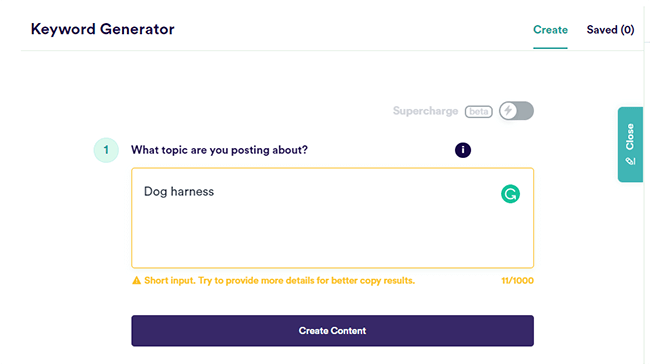
ContextMinds
ContextMinds is a little different, in that it enables you to visualise your keyword strategy. You start by adding your primary topics, and the tool will suggest related concepts which you can drag and drop to create your own keyword ‘mind map’. This is a great way of forming keyword clusters, helping you group keywords by theme and contextual relevance.
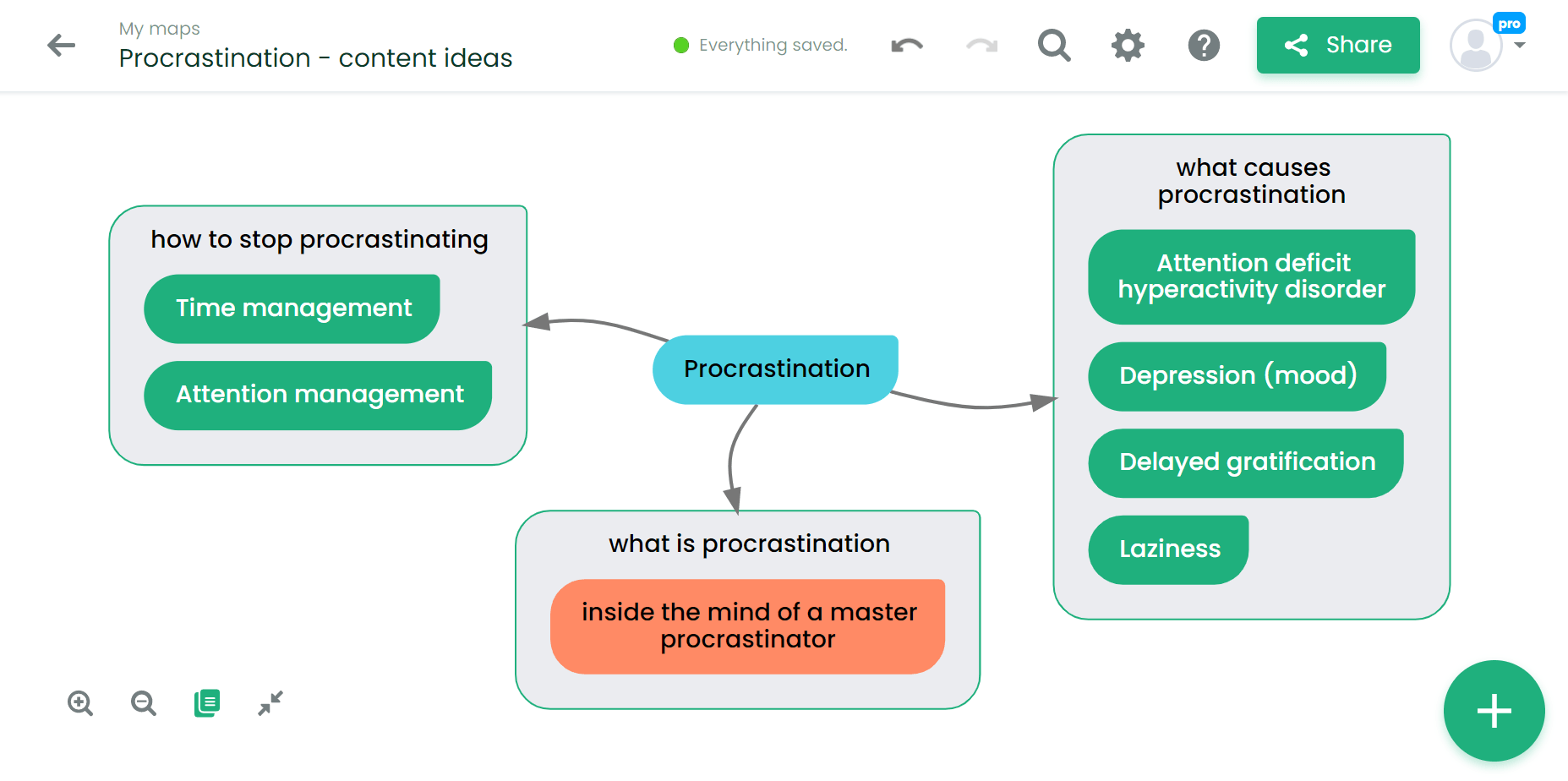
Surfer SEO
If you’re looking for more insight into relevant keywords and want to optimise your content to a high standard, Surfer SEO can help with both. It’s a AI-powered tool for content marketers and SEOs who want to create high-quality articles that rank well in search engine results for their target keyword. That said, be careful when relying solely on automation for content creation; we think it’s still important to incorporate first-person insights and creative thinking into your content.
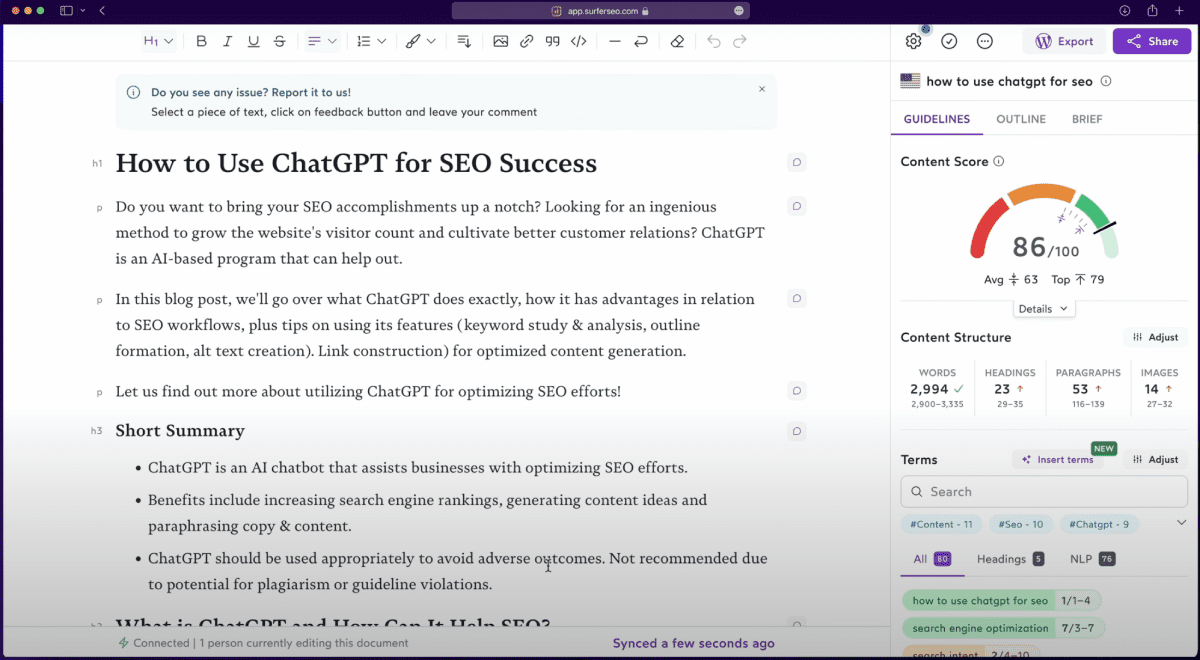
Google Keyword Planner
While not strictly AI, Google’s Keyword Planner is a powerful tool for understanding search volume and discovering new keywords. It provides insights into keywords related to your industry or niche. Although more of a beginner’s tool compared to some of the more advanced features other tools offer, it can be a good place to start.
Ubersuggest
Ubersuggest is a user-friendly tool that provides keyword ideas, content ideas, and backlink data. It’s suitable for both beginners and more advanced users. It’s a great tool for researching, planning, and tracking your keyword research. It also incorporates an AI writing tool, which helps you craft rankable content based on a specific keyword.
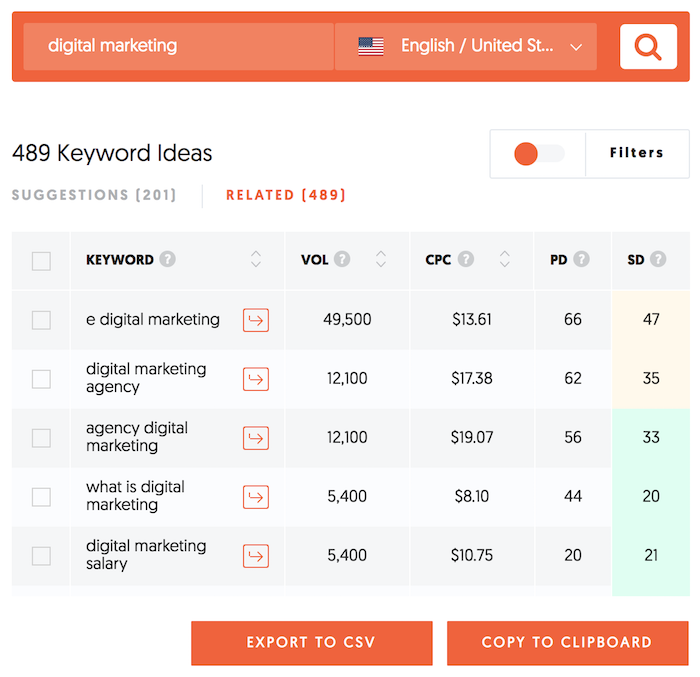
AnswerThePublic
While not technically an AI tool, AnswerThePublic uses data visualisation to show you questions people are asking about a particular keyword. It’s useful for generating question-based keywords (great for FAQs or how-to guides) and understanding user intent. Plus, you can even look beyond Google search results to discover popular keywords on YouTube, too!

It might take a little trial and error to find an AI keyword research tool that works for you, but in the long run, integrating an AI-driven tool into your keyword research strategy can be highly beneficial. These tools can streamline the research and discovery process, provide valuable insights, and enhance the efficiency of your overall keyword research strategy.
What are the benefits of using AI for keyword research?
AI can be extremely useful for keyword research, whether you’re updating an existing strategy or building a new one from scratch. Here are some of the primary advantages of using AI for keyword research:
Efficiency and speed: AI-powered tools can analyse vast amounts of data at incredible speeds, significantly reducing the time required for keyword research. This efficiency allows you to focus more on putting the strategy together and creating high-quality content.
Data-driven insights: AI tools use data-driven insights based on a comprehensive analysis of user behavior, search patterns, and competition. This ensures that your keyword strategy is grounded in real data (currently up to April 2023) rather than intuition which makes for better results.
Precision targeting: AI helps identify highly relevant and specific keywords, including long-tail variations. In the long run, this kind of targeting will start improving the precision of your content so it aligns closely with user intent.
Enhanced keyword clustering: AI can cluster keywords more effectively by identifying patterns and relationships between different search terms, so your keyword strategies better reflect user interests and search patterns.
What are the challenges of using AI for keyword research?
Although AI can be a helpful ally in your keyword research strategy, there are a few challenges and potential pitfalls you should be mindful of, too. Here are some of the main drawbacks of using AI for keyword research:
Over-reliance on automation: Depending too much on AI may diminish human intuition, and contextual understanding is required for effective keyword research. Don’t ignore your own insights about a topic, business, or service to create a more effective keyword strategy, ensuring content is valuable for both humans and search engines.
Overlooking context: Ignoring the context and trends that affect keyword demand and popularity is another limitation of AI; it can analyse keyword data, but it cannot account for external factors and changes that influence search behaviour.
Handling niche-specific language: In niche industries or specialised domains, AI may struggle to understand and generate relevant keywords, particularly if the language used is highly technical or specific to that niche.
Difficulty with real-time adaptation: Rapid changes in user behaviour and emerging trends may pose challenges for AI tools to adapt in real time. Marketers need to supplement AI insights with up-to-date market research.
While there are advantages and drawbacks to using AI for keyword research, it can become a helpful assistant, speeding up the research and discovery process, providing new insights, and potentially helping you see topics in a new way.
And don’t forget, whether you need assistance integrating AI SEO into your business or require SEO services to improve your ranking for target keywords, reach out to Seeker today! Embracing the power of AI SEO can be a transformative step in elevating your growth strategy.
